
Emurgo CEO Ken Kodama discusses plans to address missing elements in Cardano
Cardano's Emurgo team, one of the governing entities of the blockchain, is focused on filling the "gaps" in the platform's ecosystem. In an interview with Cointelegraph Magazine, founder and CEO Ken Kodama explained that they are shifting their approach to a venture studio model to address the 21 categories that they believe are lacking in comparison to other leading blockchain networks.
Building and investing: the two approaches
Kodama outlined two key approaches to fill the gaps in Cardano. Emurgo will either build the solutions themselves or provide investment opportunities. To incentivize developers, they also organize hackathons and give grants to encourage the creation of Cardano-specific solutions. By adopting a venture studio model, Emurgo aims to narrow the existing "gaps."
The importance of decentralized identity and layer-2 solutions
Decentralized identity (DID) and layer-2 sidechains are among the "gaps" that Emurgo aims to address. According to Kodama, embedded DID applications are currently lacking in Cardano and need to be developed. Additionally, the team wants to bring layer-2 solutions into the mix, as they recognize the vibrant ecosystem being built on other blockchains but not yet seen in Cardano.
Exploring zero-knowledge and optimistic rollups
Emurgo is also looking into zero-knowledge rollups and optimistic rollups, which are technologies that can enhance the scalability and efficiency of the Cardano blockchain. They have already conducted a hackathon centered around these themes and are interested in investing in these solutions to further improve the ecosystem.
Developers' experience and programming languages
One of the pressing issues hindering adoption on Cardano is the limited number of developers familiar with programming languages such as Haskell and Plutus. Kodama acknowledged the need to broaden the pool of builders who can develop on the platform. To address this, Emurgo is supporting Aiken, a toolkit and new programming language for smart contract development on Cardano. They have already educated over 2,000 builders in Haskell and Plutus but believe that additional programming languages will further expand the platform's capabilities.
Did you miss our previous article...
https://trendinginthenews.com/crypto-currency/popular-messaging-app-telegram-launches-cryptocurrency-wallet-for-its-800-million-users






